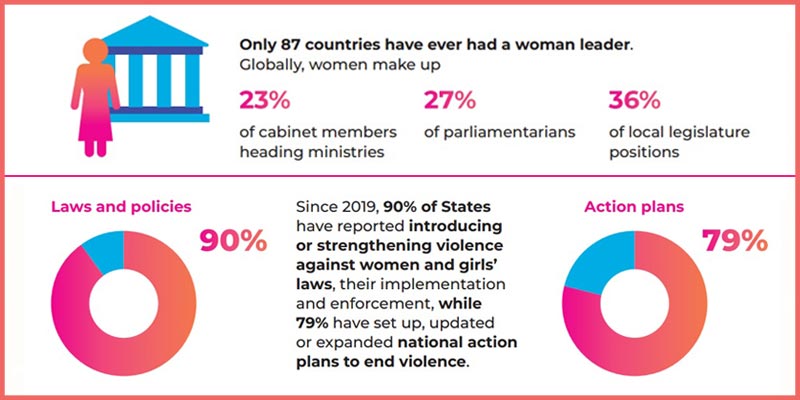- World
- Mar 08
One in four countries report backlash against women’s rights in 2024
• The basic rights of women and girls are facing unprecedented growing threats worldwide, from higher levels of discrimination to weaker legal protections and less funding for programmes and institutions which support and protect women.
• UN Women’s latest report ‘Women’s Rights in Review 30 Years After Beijing’ shows that nearly a quarter of governments worldwide reported a backlash on women’s rights in 2024.
• The year 2025 marks 30 years of progress since the ‘Beijing Declaration and Platform for Action’, the most visionary roadmap on women’s rights.
Key points of the report:
• Despite decades of advocacy, economic instability, the climate crisis, rising conflicts and political pushback have contributed to a worsening landscape for gender equality.
• While 87 countries have been led by a woman at some point in history, true parity is still a long way off.
• Alarmingly, UN Women reports that a woman or girl is killed every 10 minutes by a family member or intimate partner.
• The digital space is also exacerbating gender disparities, with artificial intelligence and some social media platforms amplifying harmful stereotypes. Meanwhile, women and girls remain under-represented in digital and tech-related fields.
• In the past decade, there has been a disturbing 50 per cent increase in the number of women and girls directly exposed to conflict, and women’s rights defenders confront daily harassment, personal attacks and even death.
• These findings underscore that crises such as COVID-19, soaring food and fuel prices, and the undermining of democratic institutions are not just slowing progress – but actively reversing gains.
Beijing Declaration and the Platform for Action
• The Beijing Declaration and the Platform for Action, adopted by 189 countries in 1995, is the most comprehensive and transformative global agenda for the achievement of gender equality and the empowerment of women and girls.
• It is also one of the reference frameworks to analyse the situation of women around the world and to assess the efforts of countries in support of women’s empowerment.
• The Platform also sets an agenda for governments, international organisations, civil society and the private sector to safeguard women’s human rights and to ensure that gender is taken into account in all national, regional and international policies and programmes.
• Progress on implementation of the Beijing Declaration is reviewed by the Commission on the Status of Women (CSW) every five years. In this regard, and since the first review in 2000, the United Nations Regional Commissions have been mandated to prepare, in collaboration with regional organisations, regional reports on progress made towards the implementation of the Beijing Declaration and the Platform for Action.
• These reports are based on national reviews conducted by each of the United Nations member countries, and feed into a global report which is consolidated by the CSW Secretariat at UN Women and presented by the Secretary General to the General Assembly.
Pivotal steps and major stumbling blocks
• As the world marks the 30th anniversary of the Beijing Declaration in 2025, UN Women’s latest report shows progress that must be acknowledged.
• Since 1995, countries have enacted 1,531 legal reforms advancing gender equality, maternal mortality has dropped by a third and women’s representation in parliaments has more than doubled.
• Some 88 per cent have passed laws and established services to eliminate violence against women and girls. Most have banned discrimination in employment, and 44 per cent are improving the quality of education, training and life-long learning for women and girls.
• More countries than ever are considering the impact of environmental degradation on women and girls and reflecting gender equality in plans for climate action.
• Yet, gender discrimination remains deeply embedded in the structures of economies and societies.
• This sustains wide and unjust gaps in power and resources, imposing a chronic constraint on progress on women’s rights. The weakening of democratic institutions has gone hand in hand with backlash on gender equality.
• Almost one quarter of countries reported that backlash on gender equality is hampering implementation of the Beijing Platform for Action.
• As gender equality faces one of its most challenging periods in decades, UN Women is calling on governments, businesses and civil society to reinforce their commitments and push back against the pushback.
Five priorities to make faster gains
The global progress review defined five cross-cutting recommendations fundamental to achieving the Beijing Declaration and Platform for Action for all women and girls:
1) Close The Accountability Gap: Fortify institutions to lead and coordinate policy action on gender equality, put gender at the centre of all policies and programmes and improve data to measure change.
2) Elevate Women’s Voices: Achieve equal participation and influence in decision making at all levels, including for marginalised groups of women and girls, and open and protect spaces for women’s groups to operate.
3) Close The Financing Gap: Make catalytic investments through national measures, such as budgets aligned with gender equality and progressive taxation, and realign global financial systems based on equity and solidarity.
4) Harness Technology: Close digital gender divides in access and benefits, ensure women and girls can lead the digital and artificial intelligence revolutions and mitigate the risks of technology-facilitated gender-based violence, privacy violations and bias.
5) Shock-Proof Services And Infrastructure: Establish gender-inclusive crisis prevention and response to avoid sudden rollbacks on the rights of women and girls and prioritise gender equality in humanitarian action.
Manorama Yearbook app is now available on Google Play Store and iOS App Store

